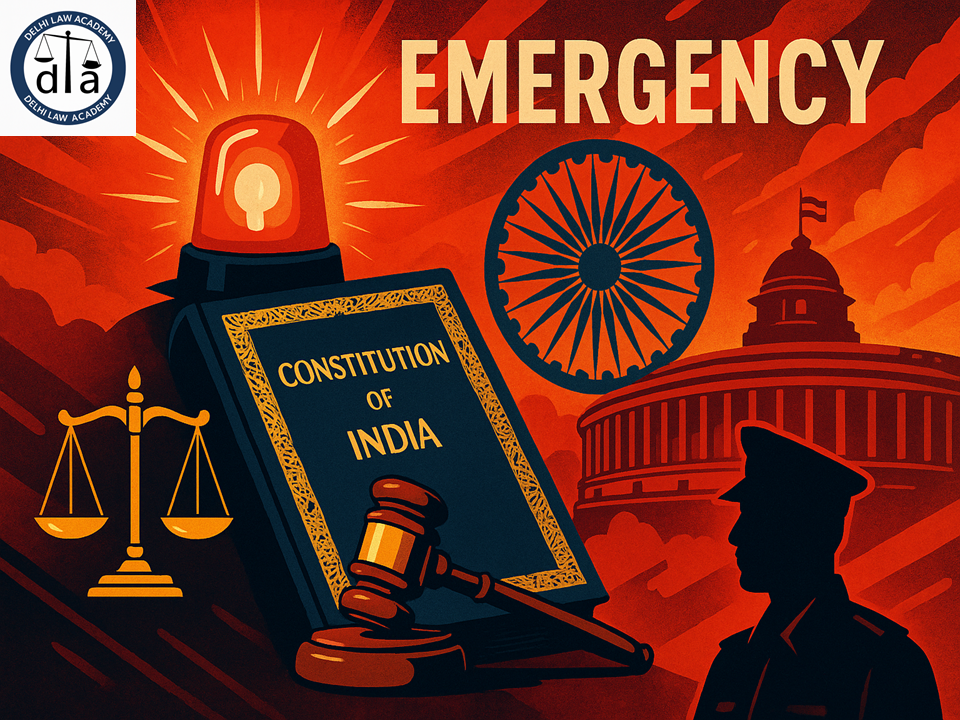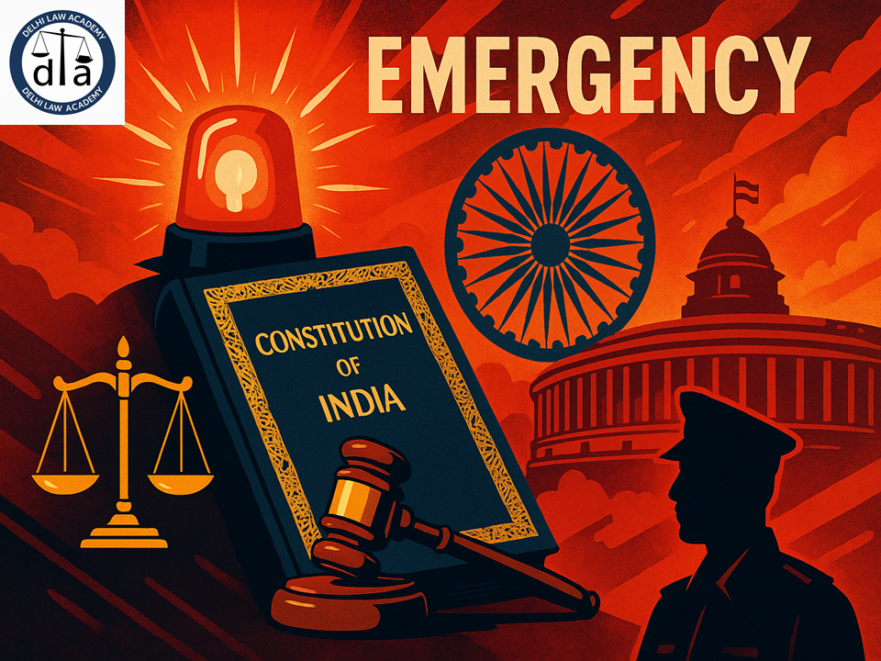
📌 Key Topics Covered in This Blog
Explore essential concepts related to Article 356, Proclamations, and Supreme Court judgments:
- ❓ Can the President dissolve the Assembly while acting u/a 356?
- ⚖️ What if the Proclamation is held invalid by the Court
- 🛡️ Situations which may justify proclamation u/a 356
- 📜 Effect of Article 365
- 🏛️ Supreme Court in S R Bommai v. Union of India [1994]
- 🏛️ Supreme Court in Rameshwar Prasad v. Union of India [2006]
- 🏛️ Supreme Court in Nabam Rebia v. Deputy Speaker [2016]
- 📝 Powers of President and Parliament to make laws for a State
Scroll down to read the detailed explanations of each topic. 👇
📌 Article 356 – Failure of Constitutional machinery in a State
- If President is satisfied, on a report from Governor or otherwise
- ⚖️ that govt of a State cannot be carried on
- ⚖️ in accordance with provisions of this Constitution
- President may by Proclamation
- assume to himself
- ⚖️ functions of State Govt
- ⚖️ powers vested in Governor
- ⚖️ powers vested in any authority other than State Legislature and High Court
- declare that powers of State Legislature
- ⚖️ shall be exercised by Parliament or under authority of Parliament
- suspend any provision of this Constitution
- ⚖️ relating to any authority other than High Court
- assume to himself
📌 Which powers to exercise?
- When the President issues Proclamation u/A 356(1), he may exercise all or any of the powers under sub-clauses (a), (b) and (c).
- It is for him to decide which of the said powers he will exercise, and at what stage.
📌 Limitation on these powers
- Clause (3) of Article 356 is intended to be a check on the powers of the President under clause (1).
📌 Effect of clause (3) as per the Constitution
- The Proclamation can not last for more than two months unless it is approved by both Houses of Parliament.
- ⚖️ It would lapse at the end of two months.
📌 Effect of clause (3) as per Supreme Court
- It will not be permissible for the President
- ⚖️ to exercise powers under sub-clauses (a), (b) and (c) of clause (1) to take irreversible actions
- ⚖️ till at least both Houses of Parliament have approved the Proclamation
📌 Effect of disapproval
- In case both Houses of Parliament disapprove or do not approve, the Proclamation lapses at the end of the two-month period
- In such a case:
- ⚖️ Govt which was dismissed revives
- ⚖️ Legislative Assembly, which may have been kept in suspended animation, gets reactivated
📌 Effect of approval
- If the Proclamation is approved by both Houses within two months
- ⚖️ the Govt (which was dismissed) does not revive on the expiry of the period of proclamation or on its revocation
- ⚖️ the Legislative Assembly if dissolved after the approval, also does not revive
📌 Question: Can the President dissolve the Assembly while acting u/a 356?
Answer:
- Article 174(2) empowers the Governor to dissolve the Legislative Assembly.
- So, when the President exercises Governor’s powers under subclause (a), he can dissolve the Legislative Assembly.
Supreme Court on this point:
- The President will not be justified in dissolving the Legislative Assembly by using the powers of the Governor u/A 174(2)(b) read with Article 356(1)(a) till at least both Houses of Parliament approve of the Proclamation.
- Dissolution of the Assembly prior to approval of Proclamation by Parliament under clause (3) will be per se invalid
📌 Effect of invalidity
- If the Proclamation is held invalid by the Court, then
- ⚖️ notwithstanding the fact that it is approved by both Houses of Parliament
- ⚖️ it will be open to the court to restore the status quo ante to the issuance of the Proclamation and hence to restore the Legislative Assembly and the Ministry
📌 Interim injunction
- In appropriate cases, court will have power by an interim injunction
- ⚖️ to restrain holding of fresh elections to the Legislative Assembly pending final disposal of the challenge to the validity of the Proclamation
- ⚖️ to avoid the fait accompli and the remedy of judicial review being rendered fruitless
📌 Situations which may justify proclamation u/a 356
- Situations when constitutional breakdown may justifiably be inferred:
- ⚖️ large-scale breakdown of law and order or public order
- ⚖️ gross mismanagement of affairs by a State Govt
- ⚖️ corruption or abuse of its power
- ⚖️ danger to national integration or security of State
- ⚖️ aiding or abetting national disintegration or a claim for independent sovereign status
- ⚖️ subversion of the Constitution while professing to work under the Constitution
- ⚖️ creating disunity or disaffection among the people to disintegrate the democratic social fabric
📌 Effect of Article 365
- Article 365 merely sets out one instance in which the President may hold that the Govt of the State cannot be carried on in accordance with the provisions of the Constitution
- It cannot be read as exhaustive of the situation where the President may form the said satisfaction
- Article 365 merely says that in case of failure to comply with the directions “it shall be lawful” for the President to hold that the requisite type of situation [contemplated by Article 356(1)] has arisen
- It is not as if each and every failure ipso facto gives rise to the requisite situation.
- ⚖️ The President has to judge in each case whether it has so arisen. Article 365 says it is permissible for him to say so in such a case.
📌 Secularism, a basic feature
- Secularism is a part of the basic structure of the Constitution
- Acts of a State Govt which are calculated to subvert or sabotage secularism can lawfully be deemed to give rise to a situation in which Govt of the State cannot be carried on in accordance with the provisions of the Constitution
Authority: 🏛️ S R Bommai v. Union of India [1994 SC]
📌 Two specific instances where the Supreme Court found the Proclamation unconstitutional
1️⃣ Rameshwar Prasad v. Union of India [2006 SC]
Facts:
- Before even its first meeting, the Legislative Assembly of Bihar elected in March 2005 was ordered to be dissolved on the ground that attempts were being made to cobble a majority by illegal means and if these attempts continued, it would amount to tampering with constitutional provisions.
Judgment:
- ⚖️ Held dissolution of the Bihar Assembly as illegal and unconstitutional.
Note:
- Although the Court held the dissolution unconstitutional it did not direct status quo ante and revival of the assembly.
2️⃣ Nabam Rebia v. Deputy Speaker [2016 SC]
Facts:
- The Congress government of Arunachal Pradesh led by Tuki was thrown out of office by the BJP-led government in Delhi in January 2016.
- In July 2016, status quo ante was restored by the Supreme Court.
Decision:
- (i) The order of Governor dated 9.12.2015 preponing the 6th session of the Arunachal Pradesh Legislative Assembly, from 14.1.2016 to 16.12.2015 is violative of Article 163 read with Article 174, and as such, is liable to be quashed.
- (ii) The message of Governor dated 9.12.2015 directing the manner of conducting proceedings during the 6th session of the Arunachal Pradesh Legislative Assembly, from 16.12.2015 to 18.12.2015 is violative of Article 163 read with Article 175 , and as such, is liable to be quashed.
- (iii) All steps and decisions taken by the Arunachal Pradesh Legislative Assembly, pursuant to Governor’s order and message dated 9.12.2015, are unsustainable in view of decisions at (i) and (ii) above. The same are accordingly set aside.
- (iv) In view of decisions at (i) to (iii) above, the status quo ante as it prevailed on 15.12.2015 is ordered to be restored.
📌 Article 357 – Power of President to make laws
- Where President has declared that
- ⚖️ powers of State Legislature shall be exercised by or under authority of Parliament
- It shall be competent for Parliament
- ⚖️ to confer power of State Legislature to make laws on President or
- ⚖️ to authorize President to delegate such power to any other authority
✅ Validity of laws
- A law so made by Parliament or President or other authority shall continue in force even after Proclamation has ceased to operate
📖 Continue the Series
Don’t stop here! Learn more about Emergency Provisions in India in our next parts:
📚 Further Reading for Law Aspirants
Explore more useful resources from Delhi Law Academy to strengthen your preparation:
❓ FAQs on Article 356 & Emergency Provisions
🛡️ What is the duty of the Union under Article 355? ➕
The Union has a duty to protect every State against external aggression and internal disturbance, and to ensure that the government of every State is carried on in accordance with the Constitution.
⚠️ What happens when there is a failure of constitutional machinery in a State? ➕
If the President is satisfied that a State government cannot function according to the Constitution, he may assume the functions of the State Government, declare that powers of the State Legislature shall be exercised by Parliament, and suspend provisions relating to any authority other than the High Court.
⏱ What is the maximum validity of a proclamation under Article 356(1)? ➕
No Proclamation shall remain in force for more than 3 years. Initial approval by Parliament allows operation for 6 months, and subsequent approvals can extend it further for 6 months at a time.
📋 Under what conditions can a proclamation extend beyond one year? ➕
Extension beyond one year is allowed only if an Emergency is in force in the whole of India or part of the State, and the Election Commission certifies that continuation is necessary due to difficulties in holding general elections.
❓ Is a proclamation under Article 356(1) subject to judicial review? ➕
Yes, the validity of a Proclamation is judicially reviewable. Courts examine whether it was issued on the basis of any material, whether the material was relevant, and whether it was mala fide. However, the court does not question the adequacy or correctness of the material.
⚖️ What are the limitations on the powers exercised by the President under Article 356? ➕
Clause (3) of Article 356 acts as a check on the President’s powers under clause (1). He may exercise all or any powers under sub-clauses (a), (b), and (c), but the exercise is subject to parliamentary approval and judicial review as applicable.
Contact us
📍 Delhi Law Academy – Jaipur Branch
6C, Tower 2, Coaching Hub, Pratap Nagar, Jaipur – 302033
📞 Phone:
+91 9911916552
+91 8447285606
✉️ Email:
contactus@delhilawacademy.com

